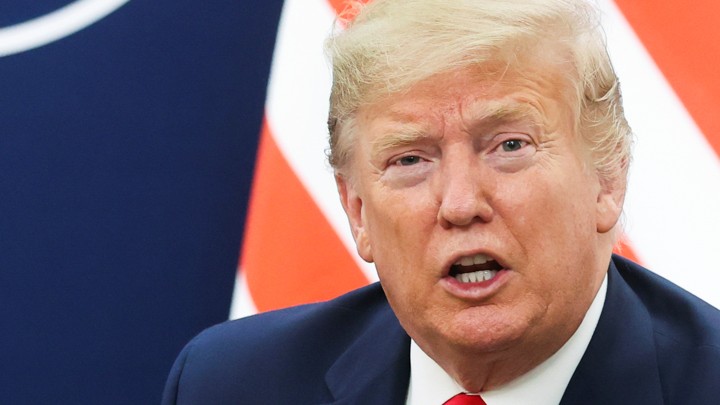
Last week, Politico reported that the Trump administration was considering adding seven new countries to its travel ban. A majority of them—Eritrea, Sudan, Tanzania, and Nigeria, which is by far the most populous of the seven—are in Africa. The rationalization appears to involve terrorism. In the “counterterrorism” section of a January 17 speech, Chad Wolf, the acting secretary of the Department of Homeland Security, declared, “We’re establishing criteria that all foreign governments must satisfy to assist DHS in vetting foreign nationals seeking to enter our country … For a small number of countries that lack either the will or the capability to adhere to these criteria, travel restrictions may become necessary to mitigate threats.”
Because the Supreme Court upheld Donald Trump’s travel ban in 2018 on national-security grounds, it’s not surprising that administration officials would cite that same rationale to expand the ban now. But the argument is weak. According to numbers crunched by the Cato Institute’s Alex Nowrasteh when Trump first imposed the ban three years ago, not a single person born in Eritrea, Tanzania, Nigeria, or Sudan killed a single American in a terrorist attack on American soil from 1975 to 2016. (The same is true of Belarus and Myanmar, two of the other three countries Trump may add to the travel-ban roster. Two people from Kyrgyzstan, the final country, were implicated in deadly anti-American terrorism incidents during the period, according to Nowrasteh’s tally.)
A Wall Street Journal article on the potential travel-ban expansion suggests a different justification: Travelers from Eritrea, Sudan, and Nigeria are more likely than travelers from other countries to overstay their visas. But if that’s the case—as Tom Jawetz, an immigration expert at the Center for American Progress, explained to me—the answer is to train the U.S. consular officers who give out those visas to better determine who won’t return home, or to actually increase visas to meet legitimate demand. The answer is not to collectively punish the population of an entire country.
But if the Trump administration’s real motivation is to decrease immigration from Africa, then collective punishment has a certain logic to it. For several years now, Trump has trained his nativist ire on Muslims and Latinos. The travel ban suggests he’s adding a new target, just in time for the 2020 elections: Africans.
According to the Pew Research Center, the number of black immigrants in the United States has grown fivefold over the past 40 years. America’s immigrant population from sub-Saharan Africa more than doubled from 2000 to 2016 alone. Trump’s allies have noticed. In her book Adios America, which Trump publicly praised, and parroted, when he launched his 2016 campaign, Ann Coulter claims, “There were almost no Nigerians in the United States until the 1970s. Today there are 380,000.” This is a problem, she declares, because “in Nigeria, every level of society is criminal.” When 500 Congolese and Angolan immigrants showed up at the Texas border last June, Tucker Carlson warned that, because of “population growth … on the continent of Africa,” African immigration “could become a torrent” that could “overwhelm our country, and change it completely and forever.”
Trump himself, according to The New York Times, vented in a 2017 Oval Office meeting that on his watch the United States had admitted 40,000 Nigerians who would never “go back to their huts.” (Nigerian immigrants are actually twice as likely to have at least a bachelor’s degree as Americans as a whole.) During an immigration meeting in 2018, The Washington Post reported, Trump referred to Haiti, El Salvador, and nations in Africa as “shithole countries.” Soon afterward, the White House unveiled a proposal to remake America’s immigration system. According to the Center for American Progress, it would have reduced immigration from sub-Saharan Africa by 46 percent, more than any other region of the world.
But while Trump’s animosity to African immigration isn’t new, it has never before taken center stage in his administration’s policies or his public rhetoric. Trump launched his 2016 presidential campaign talking about Mexican rapists. He made building a wall on America’s southern border his campaign’s rallying cry. He responded to the December 2015 jihadist attack in San Bernardino, California, by demanding a ban on Muslim immigration. He made Central American immigrant “caravans” the heart of his get-out-the-vote strategy in 2018.
Since then, however, Muslims and Latinos have become less potent scapegoats. The Islamic State lost its final patch of territory last spring. There hasn’t been a jihadist attack as deadly as San Bernardino inside the United States since Trump’s election. And the number of immigrants being apprehended at America’s southern border has declined for seven straight months, mostly because Mexico has deployed its national guard to prevent Central Americans from reaching the United States. Last July, according to Gallup, 27 percent of Americans called immigration the most important issue facing the country. By December, the figure was down to 10 percent.
So Trump is diversifying his array of immigrant threats. Singling out African countries could spark a public battle with the Congressional Black Caucus, Somalian-American Representative Ilhan Omar, and African American celebrities—just the sort of foes who rouse Trump’s base. Expect presidential tweets and Tucker Carlson monologues about Nigerian email scammers and crime rates in Lagos. In Trump’s ceaseless battle to terrify Republicans with the specter of an America no longer controlled by white men, a new front may be opening up.






